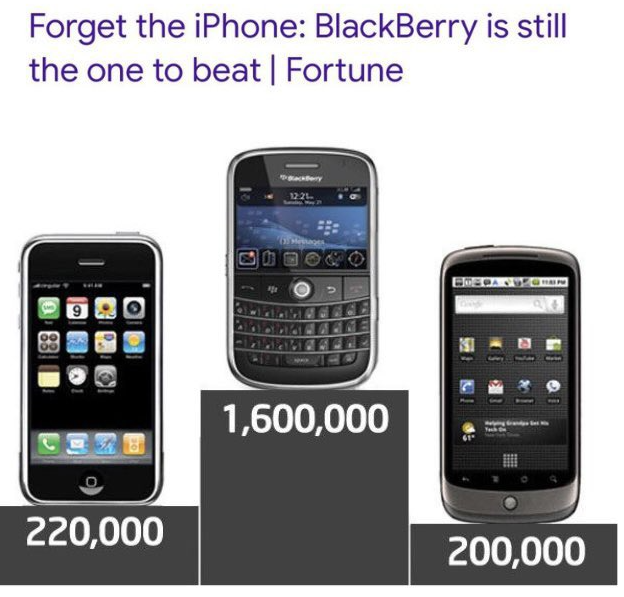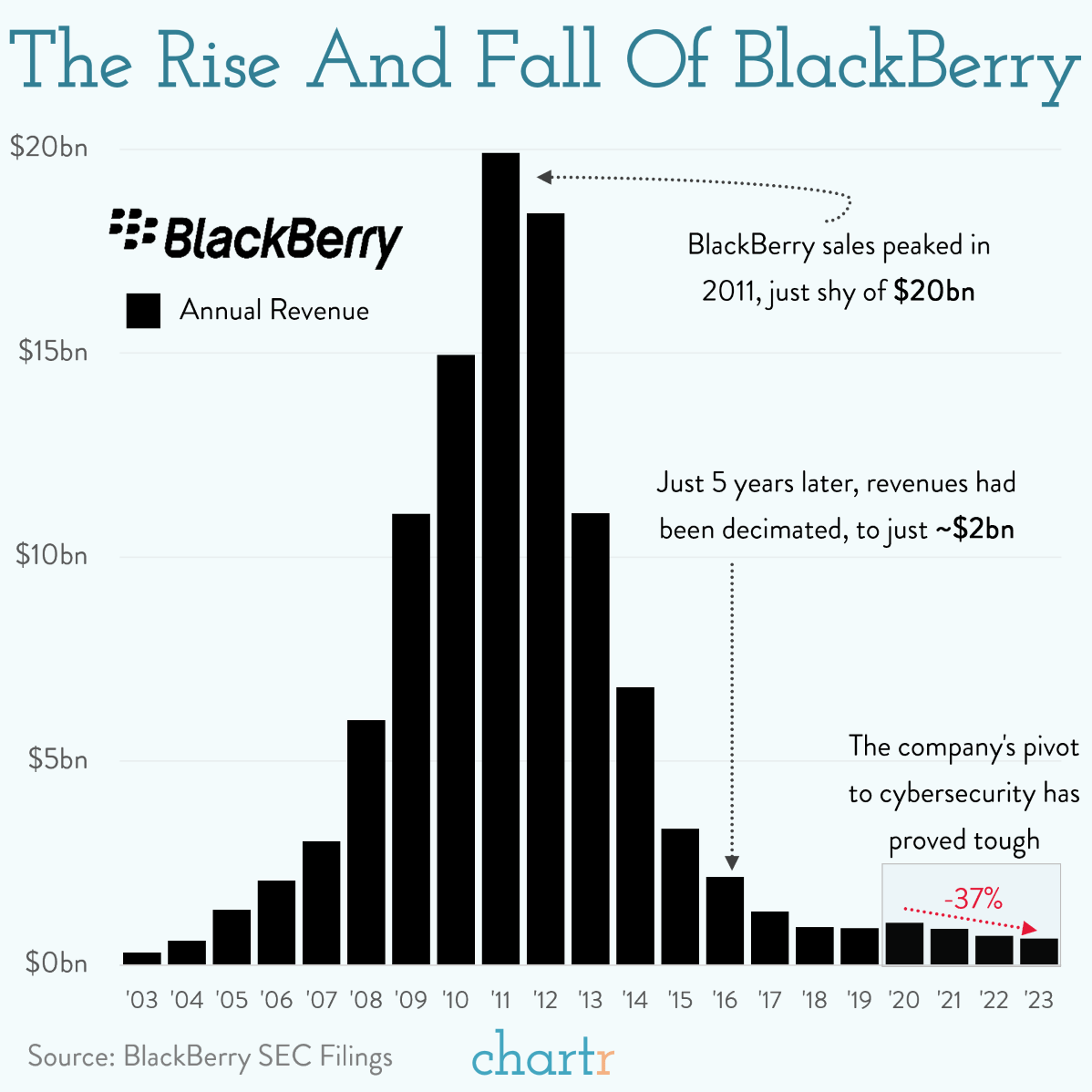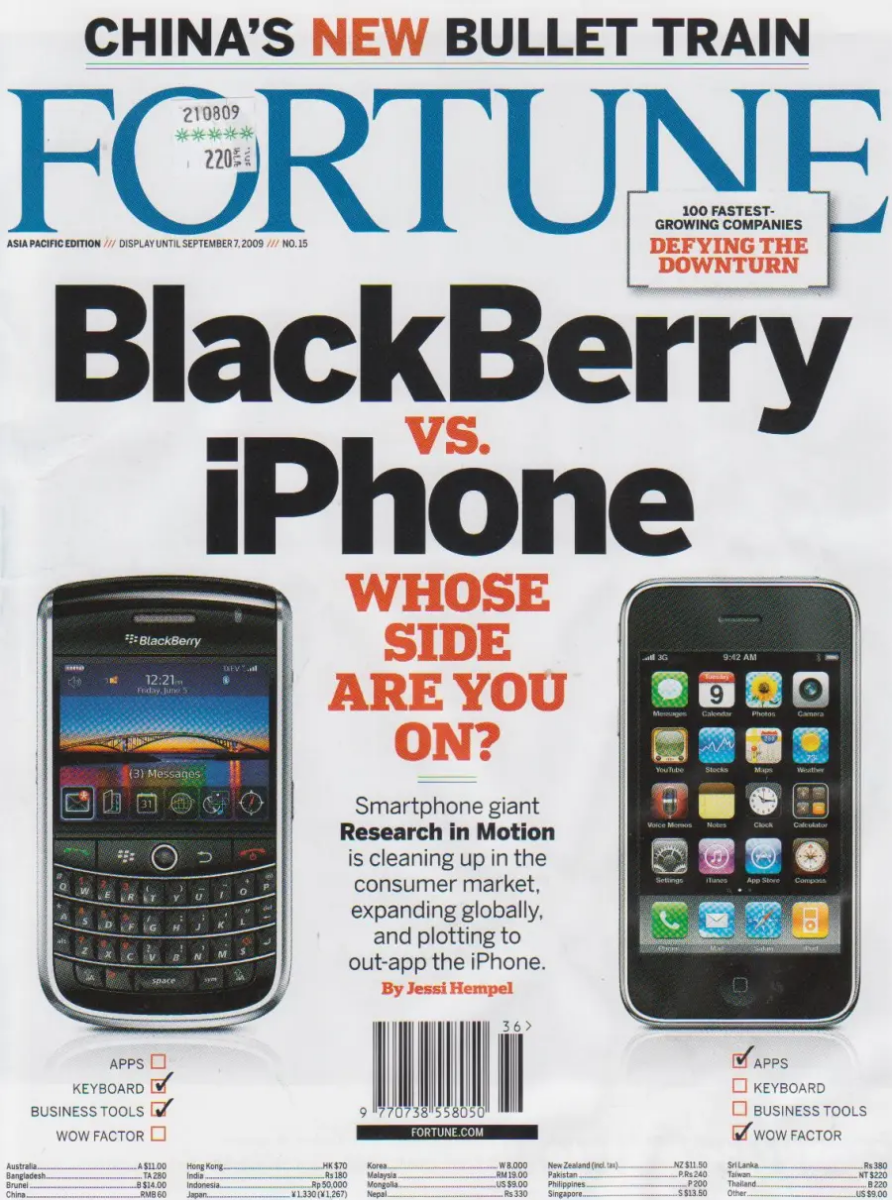How little do we know about the future? A great way to figure that out is to look to our past, to see what we previously thought about what the future will hold.
To wit: 26 years ago, the image above came from the cover story of Fortune magazine:
“There’s a lot of buzz in the smartphone business lately, with Apple’s (AAPL) iPhone turning the mobile world upside down and Nokia’s (NOK) upcoming phone announcement providing a new challenge. Despite all the hype, though, Research in Motion’s (RIMM) BlackBerry is still the most formidable force in U.S. smartphones.
This statement, of course, is gadget heresy. Popular opinion holds that the iPhone is today’s must-have device, and none of the others stand a chance. But while the iPhone is revolutionary, it’s not yet positioned to truly challenge RIM’s foothold in the smartphone market.”
The most (WTF?) formidable force in smartphones? How did that work out for Blackberry?
Not that well:
Ironically, even 2 years later in 2009, Fortune was still on the fence, seemingly rooting for RIMM while missing a massive disruptive change already taking place. This cover reveals the how they saw this debate:
The media’s tendency to treat everything like a horserace, be it in technology, investing, or politics, is more than just a poor construct — it is a lazy way to cover anything. It lacks insight; it oversimplifies, and ages quite poorly.
Today, we get to read about the travails of RIMM/Blackberry with the full benefit of hindsight. Sure, investors do not know the future, but much of the time, we have no idea about what is going on in the present.
We are wrong about a lot of things, but it’s more than that: Our over-confidence can on occasion border on arrogance. Studies show we tend to believe those exhibiting this excess confidence more than we should. This serves us very poorly as investors.
Previously:
“No matter how you cut it, you’ve got to own Cisco” -2000 (May 15, 2023)
Can Anyone Catch Nokia? (October 26, 2022)
Why the Apple Store Will Fail (May 20, 2021)
Nobody Knows Nuthin’ (May 5, 2016)
Source:
Forget the iPhone: BlackBerry is still the one to beat
By Jon Fortt
Fortune August 24, 2007
Fortune excerpt:
To wit: ABI Research says RIM captured 44 percent of the North American smartphone market this spring, up from 33 percent a year ago. The gains came at the expense of Palm (PALM), which slid from 33 percent to 24 percent.
Why the gains for RIM? Credit must go to the BlackBerry Pearl, the company’s sleekly designed effort to grab the consumer market’s attention. RIM’s 44 percent share will be a steep hill for any competitor to climb.
Don’t get me wrong, Apple is sure to gain smartphone share quickly, and its iPhone is so new that it didn’t even register in the spring numbers. But Apple’s multi-year exclusive agreement with AT&T (T) will keep it from achieving the most explosive growth. Meanwhile, RIM seems to be slowly figuring out how to appeal to consumers while offering phones through all the carriers, including Verizon Wireless (VZ), Sprint (S) and T-Mobile (DT).
More important, though, RIM also has taken valuable ground in the enterprise.
I was reminded of that fact recently during a meeting at Hewlett-Packard (HPQ), where I got a look at some new devices the company will announce in a couple of weeks. HP challenges RIM for enterprise customers, the executives and salespeople who need to stay connected to the office while they’re out and about. But RIM is clearly the leader in this arena, and my hunch is that it will be tough for anyone – even a full-service juggernaut like HP – to steal away its customers.
That’s because RIM sells more than just the BlackBerry device – it also sells the BlackBerry Enterprise Server, the backend software that keeps workers connected to e-mail and other business applications. This software sits on top of core programs like Microsoft (MSFT) Exchange and IBM (IBM) Lotus Domino, making them available on the go.
If RIM can keep those customers satisfied, it will take a lot of time and effort for rivals like HP, Apple and Nokia to pry them away.
–Fortune, August 24, 2007




